- Home
- Steven Becker
Backwater Flats Page 6
Backwater Flats Read online
Page 6
We stood looking at each other for a long second. Ray wasn’t hard to talk to, but neither of us had that innate ability to keep a conversation going. A ding came from my pocket before I could think of something to say, and I pulled my cell out. Glancing at the screen, I saw Allie had responded.
“Lucky you have a little one,” I said, reading the message. “Allie wants to bring a friend out this weekend.”
“Awkward, huh? Boy or girl?”
“Good question.” I texted her, asking who.
“Them little ones ain’t no picnic, either.”
I finished my text and looked up at him.
“Preschool and such. Becky thinks Jamie needs to be socialized.”
“That’s a bad thing?” I asked.
“It is if we have to move across the bay.”
I could see the distress on his face. This was a comfortable home for him, but getting a kid to school from the island would be a chore, especially when the weather didn’t cooperate. Before I could think of the implications of his statement, I saw a figure skimming across the water. Justine was digging hard to overcome the tidal current running through Caesar Creek and quickly coasted up to the dock.
Zero immediately perked up and ran down to greet her.
“How long you got?” I asked Ray, realizing I had said it like it was a prison sentence.
“She’s thinking after Christmas.”
We both looked down and shook our heads, knowing what it meant for both of us. Ray would lose his dream home and I would have a new neighbor. Maybe it was worth a conversation with Justine about moving to a larger place on the water that would be an easier commute for both of us, but I put that thought aside. I liked my island.
“Did you check them?” Justine asked as she stepped onto the dock. Ignoring Zero, she pulled the board from the water and set it on the dock, where she leaned it against the concrete pilings and hosed the saltwater off.
“No, I was waiting for you.” She probably guessed that I had just woken up, so I left it unsaid. My phone dinged again. “Allie wants to bring a girlfriend out this weekend.”
“Cool, that’ll be fun.”
I was thankful that it wasn’t a boy, but also felt awkward around her girlfriends. “So, I’ll tell her okay?”
“Heck, yeah. It’ll be a girls’ weekend.”
Exactly what I didn’t want. I texted Allie that it would be fine and met Justine, who had just put the board and paddle away, at the center console. Ray tagged along behind us.
“What y’all got?” he asked.
“A little experiment.” I told him about the cooler on the FWC boat.
The three of us gathered around the cooler, not sure what to do. Finally, Justine opened the lid to remove one of the lobsters from the ice. It stuck enough to pull off two of the small swimmerets. The other lobster yielded the same result.
“Okay, so two for each. How many do you think there were on the FWC boat?”
I pulled out my phone, opened the picture I had taken, and zoomed in. Placing it between us, we started counting. It was tedious work and I thought about sending the image to my computer’s larger screen, but then remembered something I’d read about how to estimate crowd size. By dividing the picture into ten sections, I quickly counted twelve swimmerets in one section. Multiplying by ten gave me a hundred-twenty. Justine, using her own method, thought there were more.
“Plus the dozen or so I put in the evidence bag, divided by two … that makes sixty lobster,” I said.
“That’s a whole lot of stupid people. Any fool knows those FWC clowns sit there every day,” Ray said.
That about summed it up. Unless they had made one huge score, which was possible, something was wrong.
“You know what they do with the confiscated catch?” I asked Ray.
“Darned good question. I’d expect, knowing our government, they’d find their way to a dumpster after being counted and recorded. Sure ain’t feedin’ the homeless.”
I thought he was right about that as well, but still couldn’t see someone tossing over twelve hundred dollars’ worth of lobster in the trash. Allowing that the “speed trap” was happening every weekend, and subtracting a couple days a month for bad weather, equaled six or seven days a month for lobster confiscation. Multiplying that by the eight months that lobster are in season gave me a sum total north of sixty-thousand dollars in lobster meat.
“I think we found a motive.”
9
“So, you’re thinking Hayward was in on some kind of scam?” Martinez asked dismissively.
I’d waited until morning, but I’d had no choice but to report in. We’d done this dance before. If there was going to be no glory, there would be no investigation. Several times Martinez had tried to shut me down by transferring an active case to another jurisdiction. His numbers looked better for it, but this method left me without closure on many of my cases. I had a feeling I was onto something now, and wasn’t going to let Martinez get away with it this time.
“You’ve said that you don’t like them operating in the park.” I’d hoped to rattle his cage by making this a revenue issue. If the FWC was writing tickets to boaters, the park service wasn’t.
He turned away from his monitors, placed his hands on his desk, and leaned forward. It was clearly a move to intimidate me. In a backhanded way, he got what he wanted. In my mind I saw myself leaning forward, placing my hands on the desk across from his, and meeting his gaze, but instead the golf trophies on his shelf caught my attention. I had long suspected they were frauds, maybe purchased at a trophy shop and prominently placed on display. Remembering who I was dealing with, I leaned back and crossed my legs—the opposite reaction to what he expected from me.
Living on an island you get to read a lot. I’d downloaded a copy of Marcus Aurelius’s comments on life titled The Emperor’s Handbook. I recalled one of my favorite passages from the Stoic’s guide: The first rule is to keep an untroubled spirit; the second is to look things in the face and know them for what they are. The golf trophies were just a reminder of who my boss was.
“This could work out to our advantage.”
He backed away slightly. “It’s always a good idea to think of the department first.”
I had made contact and was rounding first base.
“It would be more revenue for the park.”
He was clearly interested. “A lobster reclamation program.” I was about to slide into second, but from his expression, I thought the play might beat me. Before he could pass judgment, I blurted out my half-baked plan.
“We take the shorts from the FWC and place them back in the Biscayne/Card Sound Sanctuary. Could be a lot of good publicity.”
The ball skidded off the base just out of reach of the shortstop. I was safe at second.
“This could be something Susan would be good at.” The pitcher wound up and threw a wild pitch past the catcher. I easily pulled up at third base.
“Keep talking.”
“Given Susan’s relationship with Robinson and his crew, she’d head up the effort for the park. It would only take a few tanks to hold the shorts we confiscate, and we could put them on display in the welcome center. Might be a big draw.”
“Sounds like the cost would be minimal.” He steepled his fingers together and leaned back, calculating revenue, less expenses, multiplied by exposure. As he leaned towards his monitors, I thought I had lost him until he picked up the phone and hit a single button.
“Susan. Can you come in here, please,” he spoke into the handset.
I almost commented aloud, but kept it to myself. I don’t recall him ever using that last word with me. Again, a glance at the fake golf trophies reminded me who I was dealing with, and I breathed deeply, trying to relax.
Susan entered the office and took her usual chair.
“We would like to leverage your relationship with Robinson and the FWC to spearhead a joint project.”
He made putting some lobsters in a tank an
d releasing them a few miles from here sound important.
“Sounds interesting. We’d have to adjust my workload accordingly,” Susan said.
Listening to these two public employees who had mastered the system, I almost reached for my pad to take notes. Martinez went on to explain my proposal, doing his best to make it seem like his own. The subject of what the FWC was presently doing with the shorts never came up.
Robinson’s reaction to the proposal would be interesting. “I’d like to be there when you present the idea,” I said.
Susan turned to look at me, and then at Martinez, who read her expression and backed her up. “That won’t be necessary, Hunter. You just keep working the case.”
“Any leads?” Susan asked.
I had to tell her about the lobster gauge being a strong possibility for the murder weapon. Pausing, I wondered if I should share my theory that the shorts were being sold, figuring that Martinez would tell her the second I was gone.
The two batters behind me had struck out and the coach signaled a hit and run. I had nothing left to lose, and told her. I’d expected her to laugh it off, protecting her friends, but she was quiet, leading me to believe that she already knew or, at least, suspected something.
“Alright, back to work, everyone,” Martinez said, turning back to his monitors.
I took that as a dismissal and rose to leave. Susan was right behind me and stopped me in the hallway.
“You wanted some help? You were going to meet me yesterday.” Of course, she remembered.
“It’s nothing, really.” I started walking away, then changed my mind. She had taken over the lobster reclamation program like it was a promotion. If there was ever a good time to ask her, it would be now.
“Hayward or any of those guys throwing around money they maybe shouldn’t have?”
She looked down. “You really shouldn’t talk about the deceased like that.” That was as much of an answer as I was going to get out of Susan. Reminding her that I would be happy to meet Robinson later, I walked away thinking the discussion would probably happen in a dimly lit bar—and I would be nowhere close. Back in my office, I fired up the ancient computer. My laptop out at Adams was a much faster machine, but the internet connection there was slower. While my desktop booted up, I grabbed a cup of coffee and checked my phone. There was a message from Allie that her mom would have her and her friend at headquarters around five on Friday. Apparently, her car had broken down a few days ago and was in the shop. I responded that I would be there and turned to the computer.
“Follow the money” was an oft-used phrase for good reason. There would be no waterfront homes bought from this scam, but sixty-grand was enough for a fast car or expensive vacation. Hoping Robinson had followed through on my request, I checked my email first. Surprisingly, there was something from an “Anita” at the FWC. It wasn’t the entire file, but it did have Hayward’s social security number.
The park service computers had access to several databases and credit agencies. Logging into one, I entered Hayward’s name and social. The screen went black for a long second, then started to populate. I scanned the results. Reading between the lines of a credit report was far from an art, but did require some work. Entering his address in the tax collector’s website, I obtained a value for his property. It, of course, had to be adjusted for reality, forcing a detour to Zillow, where I got some comps from other, similar houses in his neighborhood. After a few minutes of study, nothing jumped out at me. Average credit score, average debt, average mortgage.
Hoping the coast was clear, I closed and locked my door, and passed Martinez and Susan’s offices. I’d reached a point where I had a theory, but not much in the way of evidence to confirm it. When I reached this point in a case, I usually hit the water for inspiration. Thinking a run down to the southern end of the bay, inside the boundaries of the lobster sanctuary, might give me some ideas, I said goodbye to Mariposa and left the building. At the dock, I hopped aboard my boat, started the engine and freed the lines. Idling out of the channel, I was surprised the FWC boat wasn’t in its usual lurking place. Thinking back, I didn’t recall that it had been docked, either.
I decided it was worth the few minutes to backtrack and check. The twin-engine RHIB was there, but not the center console they used for traffic stops. Retracing my path, I scanned the ramp area and small marina beyond it. There was still no sign of it. I couldn’t remember a time when I had seen the boat leave the channel, and decided to stop at the fuel dock and ask Will if he had seen them today.
I waited while he filled a sailboat that was moored in the small marina behind the ramp to question him.
“Headed out around an hour ago,” he answered.
“Ever see them leave the channel before?”
“Back before Robinson, things were different—like they did their jobs instead of harassing people.”
I didn’t need much fuel, but I decided since it was a slow day I could keep him talking. He’d know there was a tip coming as well—probably the only one he got from the park service people. It was hard handing over the government credit card and then tossing in some of my own cash, but I knew his was a low-paying job and he relied on tips to make it worthwhile. Unlike other members of my department and the FWC, I also thought it was important to make friends.
The sailboat moved off and I pulled the boat forward to take its place. I shut down the engine and removed the key and kill switch from the ignition panel. On the chain was the two-pronged key used to open the gas cap. Once I unscrewed it, Will handed me the pump.
“Probably only needs ten gallons,” I warned him. Unlike cars, marine fuel pumps don’t stop automatically. An overflow port on the side of the boat warns you seconds before the tank fills.
“Got a big day planned?”
“Nah, just toppin’ her off.” I could tell he was curious now. I usually never stopped unless the seventy-gallon tank was less than half full.
“Any talk going around about Hayward?” I tried to make it sound like I was just making conversation.
“I watch those guys when we’re slow. It’s kinda like sport, seeing who’s gonna get mad and go off on them.”
“What do you mean?” I didn’t like writing tickets, but most people were on their best behavior after getting pulled over. There was no point in antagonizing the law.
“I guess y’all are a different department. From what I seen and hear, those guys hand out more tickets for safety violations than fishing stuff.”
This was the second time I’d heard that observation. “You’d think they would just be checking fishing licenses and catches.”
The gurgling of the tank stopped our conversation. A small stream of gas shot out the overflow, signaling me to shut off the pump. I was a second too late, and gas dribbled over the gunwale. Exchanging the pump for a paper towel, I cleaned up the mess, screwed the cap back in and followed Will to the small building where he ran credit cards. Pulling out the park service card, I handed it to him along with a ten-dollar tip.
“Appreciate it, man.”
“Do me a favor and keep an eye on them for me.”
“Sure thing, man. Never liked that Hayward dude.”
Thinking about what I’d learned, I thanked him and walked back to the boat. Stepping aboard, I could smell gas from the spill, but knew it would dissipate as soon as I started running. I stuck the small plastic piece in the kill switch, inserted the key into the ignition, and started the engine. After resetting the fuel level on the engine gauge, I went to release the lines, but Will was already there to help.
“Hey, did you see which direction he headed?” I asked him.
“South, man.”
I nodded and pressed the throttle forward. Cutting the wheel to port, and with an assist from the southerly wind, the boat eased away from the dock. It was tempting to speed up and cut the last two markers. There was no traffic, and being high tide, I knew there was plenty of water, but I curtailed myself. Anyone seeing a par
k service boat take that route might copy me, and if they did so at a low tide would ground. The blame instantly would fall on me.
10
I was tempted to speed across the bay in search of the FWC boat, but decided if I did encounter them, it couldn’t appear like I was out there looking for them. Instead I steered a southeast heading, holding to 3600 rpms, just enough to keep the underpowered boat on plane. Scanning the water, I crossed to the barrier islands, the beginning of the Upper Keys. Below Old Rhodes Key was an area I checked regularly. The mangrove-lined shore and winding creeks separating the Atlantic and Biscayne Bay were perfect places for nefarious activity.
Though I’d been here often, I still relied on my chartplotter to remind me of the ins and outs of the small islands. Starting at the northern end, I worked my way south, checking each creek along the way. I ran into several guides, none of who were friends, but they all waved just to make it look that way, and not garner any attention. I’d been scouting for a good two hours when I started to think the FWC boat had gone somewhere else. Other scenarios, from taking it for maintenance to a routine patrol, crossed my mind, but I dismissed them. Hayward was dead and something suspicious was going on.
I continued my search, crisscrossing between the Atlantic and the bay, until finally the northern coast of Key Largo appeared ahead. Wherever they had gone, the boat was either not here or I had missed it.
But there was another area that might be worth checking. Across Cutter Bank I could see Long Arsenicker Key. Midnight Pass was behind it and out of sight; a favorite spot for smugglers.
Transversing the narrowest part of the bay took only a few minutes, and I was about to enter Midnight Pass when I thought I saw the bow of a boat. As it emerged I could see the FWC logo stenciled on its bow flare. I’d found my target, but had no plan. That was taken out of my control when the man at the wheel waved at me, then started to idle in my direction. Excuses ran through my mind until I realized it was less suspicious that I was here than he was.

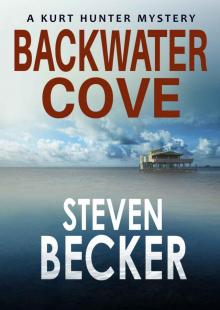 Backwater Cove
Backwater Cove Storm Surge: A Fast Paced International Adventure Thriller (Storm Thriller Series Book 3)
Storm Surge: A Fast Paced International Adventure Thriller (Storm Thriller Series Book 3)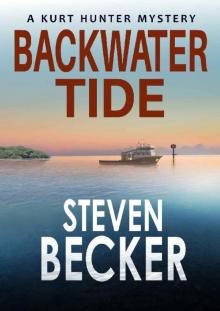 Backwater Tide
Backwater Tide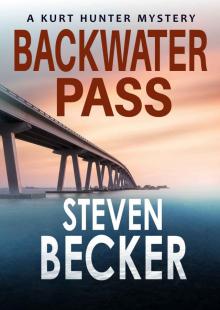 Backwater Pass
Backwater Pass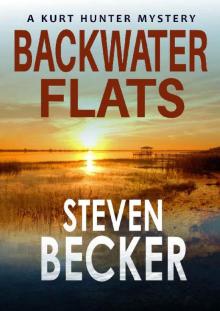 Backwater Flats
Backwater Flats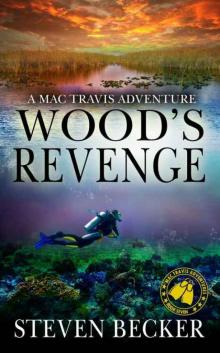 Wood's Revenge
Wood's Revenge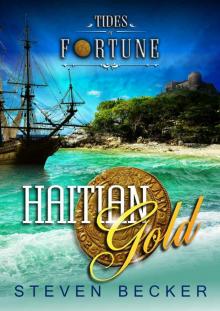 Haitian Gold
Haitian Gold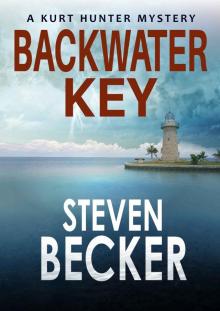 Backwater Key
Backwater Key Wood's Tempest
Wood's Tempest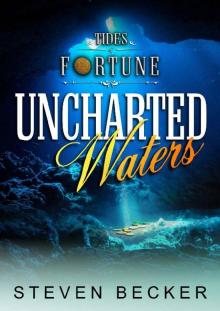 Uncharted Waters
Uncharted Waters Tuna Tango
Tuna Tango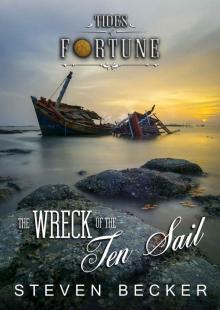 The Wreck of the Ten Sail
The Wreck of the Ten Sail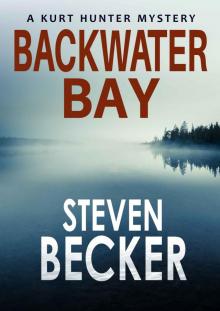 Backwater Bay (Kurt Hunter Mysteries Book 1)
Backwater Bay (Kurt Hunter Mysteries Book 1) Storm Clouds
Storm Clouds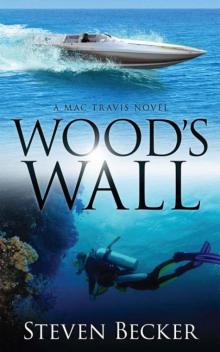 Wood's Wall
Wood's Wall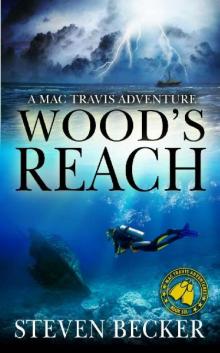 Wood's Reach
Wood's Reach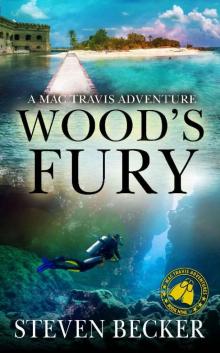 Wood's Fury
Wood's Fury Storm Rising
Storm Rising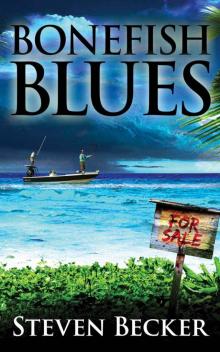 Bonefish Blues
Bonefish Blues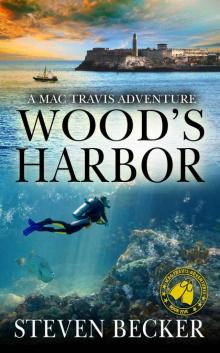 Wood's Harbor: Action & Sea Adventure in the Florida Keys (Mac Travis Adventures Book 5)
Wood's Harbor: Action & Sea Adventure in the Florida Keys (Mac Travis Adventures Book 5)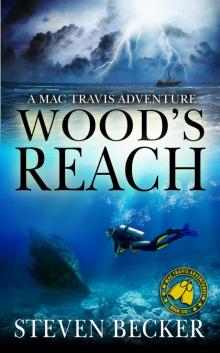 Wood's Reach: Action & Sea Adventure in the Florida Keys (Mac Travis Adventures Book 6)
Wood's Reach: Action & Sea Adventure in the Florida Keys (Mac Travis Adventures Book 6)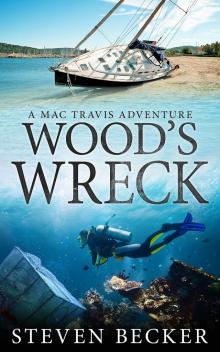 Wood's Wreck
Wood's Wreck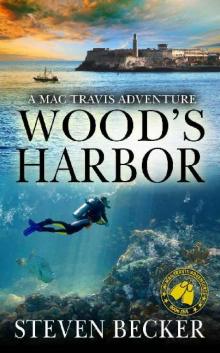 Wood's Harbor
Wood's Harbor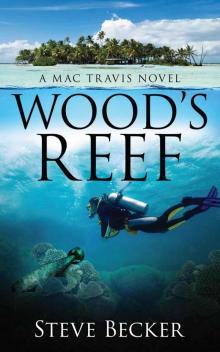 Wood's Reef
Wood's Reef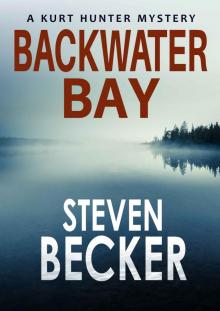 Backwater Bay
Backwater Bay